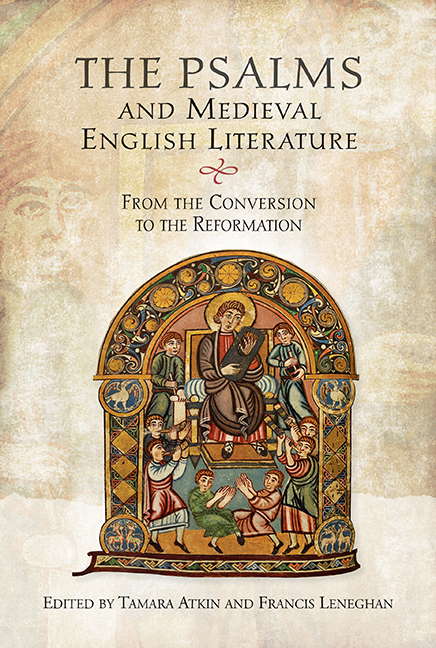Book contents
- Frontmatter
- Contents
- Figures
- Contributors
- Preface
- Acknowledgements
- Abbreviations
- Miscellaneous Frontmatter
- Introduction A Case Study of Psalm 50.13 in Old and Middle English
- I Translation
- II Adaptation
- III Voice
- 10 Maidstone's Psalms and the King's Speech
- 11 The Songs of the Threshold: Enargeia and the Psalter
- 12 Psalms as Public Interiorities: Eleanor Hull's Voices
- 13 Vox ecclesiae, vox Christi: the Psalms and Medieval English Ecclesiology
- Index
10 - Maidstone's Psalms and the King's Speech
from III - Voice
Published online by Cambridge University Press: 09 May 2017
- Frontmatter
- Contents
- Figures
- Contributors
- Preface
- Acknowledgements
- Abbreviations
- Miscellaneous Frontmatter
- Introduction A Case Study of Psalm 50.13 in Old and Middle English
- I Translation
- II Adaptation
- III Voice
- 10 Maidstone's Psalms and the King's Speech
- 11 The Songs of the Threshold: Enargeia and the Psalter
- 12 Psalms as Public Interiorities: Eleanor Hull's Voices
- 13 Vox ecclesiae, vox Christi: the Psalms and Medieval English Ecclesiology
- Index
Summary
The Psalms are voices; saying them we become or we inhabit a voice that is and is not our own, something that Richard Maidstone realized in his powerful late fourteenth-century translation into Middle English of the Penitential Psalms (Pss. 6, 31, 37, 50, 101, 129, 142). As a sequence, they were linked to David's penitence for his adultery with Bathsheba and murder of her husband Uriah and thus were seen to point up David's anguished recognition of his humanity and humble acceptance of God's justice, power and forgiveness. Penance is for the person of faith what conversion is for the unbeliever. I have argued previously that Maidstone's translation of the Penitential Psalms both offers a model of conversion by dramatizing anyone's fall, penance and re entry into God's grace and, because they are supposedly voiced by King David, suggests the very limits of sovereignty and hence the more troubling aspects of sovereign power. Both subjects, conversion and the nature of sovereign power, are central to Maidstone's roughly contemporary other ‘public’ work, the Concordia. Maidstone wrote the Concordiato ‘celebrate’ the resolution of the quarrel between Richard II and London in August, 1392. It shares with his Penitential Psalmsa keen sense both of the form in which he chose to write and of the ways in which that form might be used to teach even a king a lesson about humility.
These two texts, one in eloquent Middle English, the Concordiain what David Carlson describes as a plain, classicizing Latin style, belong to a period in his life when Maidstone moved among the mighty and possibly wrote at their behest, in so doing inventing voices for them. In his Penitential Psalms, Maidstone does more than translate from Latin to English; he conveys the petitionary anguish of the psalms themselves and hence the process by which commoners, like kings, experience conversion. The strategies he employs in writing the Concordiaare different. He composes an account of a London pageant for Richard II in Latin, thus making private or exclusive what was a public and vernacular civic occasion. The Concordiais one of several texts that describe this civic pageant; in some points it differs from accounts that are intended to be factual and should be seen as less a description of what happened than as a reading and application of the event.
- Type
- Chapter
- Information
- The Psalms and Medieval English LiteratureFrom the Conversion to the Reformation, pp. 255 - 270Publisher: Boydell & BrewerPrint publication year: 2017



